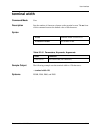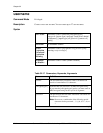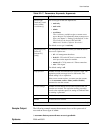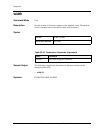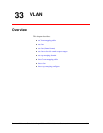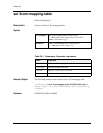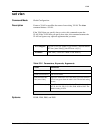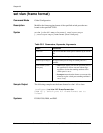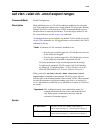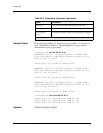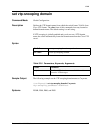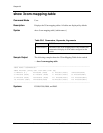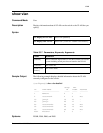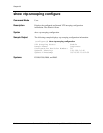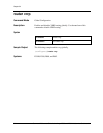
Document No. 10-300090, Issue 1 33-5
VLAN
set vlan <vlan-id> <mod-swport-range>
Command Mode Global Configuration.
Description Binds additional ports to a VLAN if trunking is enabled on the specified
port. Non-trunk ports support only a single, default VLAN per port. Binding
multiple VLANs to a non-trunk port is NOT recommended and can have
adverse effects on network performance. To set the single, default VLAN
for a non-trunk port, use the set port vlan command.
All untagged frames are forwarded to the default VLAN, which you use the
set port vlan command to set. All tagged frames are forwarded to the VLAN
indicated by the tag.
* Note: If automatic VLAN creation is disabled on an:
• 80-series port, packets tagged for a VLAN that does not exist
on the switch are dropped.
• 50-series port, packets tagged for a VLAN that does not exist
on the switch are forwarded to the default VLAN.
For more information on the relationship between the settings
for trunk mode, automatic VLAN creation, and VLAN binding,
see Chapter 8, “Configuring Ports,” of User Guide for the Avaya
P580 and P882 Multiservice Switches, Software Version 6.1.
When you use the set vlan {<vlan-id> | name <vlan-name>} <mod-
swport-range> command to bind multiple VLANs to a port, the port
becomes part of the flooding domain of the selected VLAN. This command
provides an alternative to using the binding types bind to all and bind to
receive that makes it possible for you to add ports to a subset of VLANs on
the switch.
* Important: This configuration may cause undesirable results, for
example, destination unicast storms, and should be used
only under special circumstances and only with the
assistance of customer support.
Syntax
To Bind Ports: set vlan {<vlan-id> | name <vlan-name>}
<mod-swport-range>[...,<mod-swport-range>]
To Remove Ports: clear vlan {<vlan-id> | name <vlan-name>}
<mod-swport-range>[...,<mod-swport-range>]



